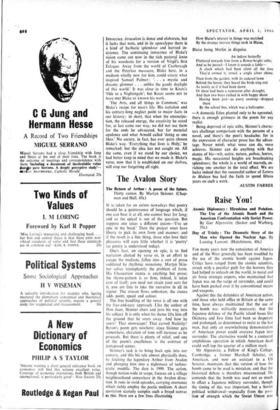The Avalon Story
IT is taken for an axiom nowadays that poetry should be a quintessence of language which, if one can bear it at all, one cannot bear for long; and so the epical is out of the question. But suppose one takes a different axiom—'I've an epic in my head.' Then the project must have liberty to pick its own form and manner; and if the result is a fine thing, those who love their pleasures will care little whether it is 'poetry' (as poetry is understood today).
One's fear, on opening an epic, is to find narration choked by verse or, in an effort to escape the medium, fallen into a sort of prose saddened by rhythmic monotony. Martyn Skin- ner solves triumphantly the problem of form. His Chaucerian stanza is anything but prose; the rhyme-pattern is so firm, indeed, it takes care of itself; you need not strain your ears for it, you are free to take the narrative in all its vigour. The stream flows unbroken; the stanza adds point, speed and colour.
The free handling of the verse is all one with the free-and-easy approach. Like the author of Don Juan, Skinner chats and jests his way into his subject. It is only when his theme lifts him off the ground that he soars away. And how he soars! That snowscape! That carved Nativity!' Byron's poem gets nowhere; since Skinner gets somewhere, elevation of tone will increase as he proceeds. But there is plenty of relief, and one of the poem's excellences is the contrast of juxtaposed scenes.
Skinner's task is to bring back epic into our century, and this his tale almost physically does, by fetching the legendary Arthur from Avalon and plunging him into a nightmare of techno- cratic muddle. The date is 1999. The action, though nation-wide in scope, focuses on a village neighbourhood somewhere in the Avalon direc- tion. It runs in vivid episodes, carrying overtones which richly employ the poetic medium. A short quotation scarcely samples such a broad canvas as this. Here are a few lines illustrating How Blaise's interest in things was matched By the strange interest things took in Blaise, Blaise being Merlin in disguise.
An indoor butterfly
Fluttered towards him from a flower-bright table; And as he passed—I know it sounds a fable—
A clock which had been silent all the time They'd owned it, struck a single silver chime.
Then from the garden, with its cedared lawn Behind the house, they heard the birds sing out As lustily as if it had been dawn Or there had been a rainstorm after drought; And then two boys rushed in with happy shout Having been just—as every evening—dropped there By the school bus, which was a helicopter.
—A domestic Eden planted only to be uprooted; there is enough grimness in the poem for any realist.
Being deprived of epic stilts, Skinner's charac- ters challenge comparison with the persons of a novel, and there's the poet's headache; for in the expression of character prose has the advan- tage. Never mind; what verse can do, verse achieves. Skinner can do anything with that stanza of his—wit, satire, nature, pathos, horror, magic. His occasional heights are breathtaking splendours; the whole is a world of marvels, en- riching one another in the total effect. We are lucky indeed that the successful author of Letters to Malaya has had the faith to spend fifteen years on such a work.
AUSTIN FARRER


































 Previous page
Previous page